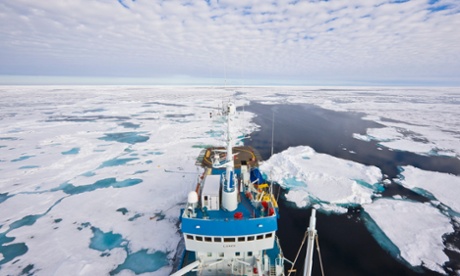 Arctic sea ice remained on its death spiral on Wednesday, with the amount of winter ice cover falling to its fifth lowest on the satellite record, scientists at the National Snow and Ice Data Center said.
Arctic sea ice remained on its death spiral on Wednesday, with the amount of winter ice cover falling to its fifth lowest on the satellite record, scientists at the National Snow and Ice Data Center said.
The scientists said Arctic sea ice extent for March averaged 4.80m sq km (5.70m sq miles). That's 730,000 sq km below the 1981-2010 satellite average.
The latest findings reinforce a trend that could see the Arctic losing all of its ice cover in the summer months within decades.
Arctic sea ice falls to fifth lowest level on record
A Quarter Of Europe's Bumblebees, Vital To Agriculture, Face Extinction
Almost a quarter of Europe's bumblebees are at risk of extinction due to loss of habitats and climate change, threatening pollination of crops worth billions of dollars, a study showed on Wednesday.
Sixteen of 68 bumblebee species in Europe are at risk, the Red List of the International Union for Conservation of Nature (IUCN) said. It is preparing a global study of the bees, whose honeybee cousins are in steep decline because of disease.
Sahara desert dust brings smog to Britain
 British authorities on Wednesday warned people with heart or lung conditions to avoid exertion as a combination of European emissions and Sahara dust created a "perfect storm" of pollution that blanketed the country in smog.
British authorities on Wednesday warned people with heart or lung conditions to avoid exertion as a combination of European emissions and Sahara dust created a "perfect storm" of pollution that blanketed the country in smog.
The environment department said air pollution in some areas reached the top rung on its 10-point scale.
The department said the smog was caused by pollution from Britain and industrialized areas of the continent — trapped in place because of light winds — mixing with dust blown up from a storm in the Sahara desert.
Oklahoma Earthquakes: Overnight Swarm Produces State's Strongest Quakes of 2014
A swarm of earthquakes struck central Oklahoma Saturday and early Sunday, producing the state's strongest quakes so far in 2014, according to the U.S. Geological Survey.
The primary swarm of earthquakes was centered in northwestern Logan County and northeastern Kingfisher County, about 12 miles north of Crescent.
In that cluster, the USGS recorded nine earthquakes ranging in magnitude from 2.6 to 4.3 between 10 p.m. CDT Saturday and 7 a.m. Sunday. The two earthquakes measuring 4.3 on the moment magnitude scale were the strongest earthquakes so far in 2014 in Oklahoma, eclipsing a 4.1 jolt centered near Langston on Feb. 8.
Earth Hour 2014: World To Turn Off The Lights For 60 Minutes In Honor Of The Environment
The Great Wall. Times Square. The Eiffel Tower.
Many of the worlds greatest, and most illuminated, monuments will go dark for an hour on Saturday for the eightth annual Earth Hour. More than 150 countries and millions of people will engage in a crowd-sourced conservation effort from 8:30 to 9:30 p.m. local time, highlighting a growing need to protect the environment, while encouraging global action.
UN science report: Warming worsens security woes
 In an authoritative report due out Monday a United Nations climate panel for the first time is connecting hotter global temperatures to hotter global tempers. Top scientists are saying that climate change will complicate and worsen existing global security problems, such as civil wars, strife between nations and refugees.
In an authoritative report due out Monday a United Nations climate panel for the first time is connecting hotter global temperatures to hotter global tempers. Top scientists are saying that climate change will complicate and worsen existing global security problems, such as civil wars, strife between nations and refugees.
They're not saying it will cause violence, but will be an added factor making things even more dangerous. Fights over resources, like water and energy, hunger and extreme weather will all go into the mix to destabilize the world a bit more, says the report by the Nobel Peace Prize-winning Intergovernmental Panel on Climate Change. The summary of the report is being finalized this weekend by the panel in Yokohama.
Pa. court loosens limits on anti-fracking activist's movements
A Pennsylvania judge on Friday loosened a court injunction restricting the movements of Vera Scroggins, who was banned from setting foot on property owned by or leased to Cabot Oil & Gas Co. in Susquehanna County — and therefore unable to shop at her favorite grocery store, go to the nearby hospital, or visit some of her friends.
Scroggins has been lauded by environmentalists — and has become notorious among oil and gas operators — after years of giving fellow activists, local residents and even celebrities tours of local hydraulic fracturing operations.
More Articles...
Page 47 of 202

 Environmental Glance
Environmental Glance






























